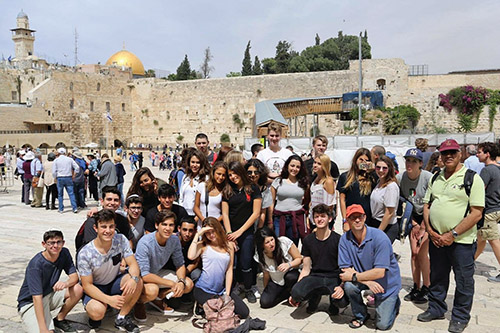

Making aliyah is an achievable dream, but it is one that takes careful planning. A growing number of organizations are helping families with complex issues make a smooth transition to integrated life in Israel.
There are many challenges when making aliyah from North America to Israel. Those hurdles become even more daunting when children of all ages are part of the equation, and especially acute if children with special needs are involved. How to successfully pull up children’s physical and social roots and replant them in the Holy Land within a nurturing environment becomes the primary factor for parents considering aliyah.
Common wisdom says that making aliyah with teenaged children should be avoided. It can be hard for children at this precarious stage in life to make such a large adjustment. One educational program that has been lionized for providing a solution for teens wishing to integrate into Israeli society is Naale Elite Academy.
The 9th-12th grade high school enables the teenage students to get used to a different educational situation, mentality and language within a specially tailored program. Teens study as part of Israeli boarding schools in tailored programs with other students who speak their mother tongue. With intensive Hebrew classes and round-the-clock support from professionally trained staff, teens are able to adapt to the differences in their new life together with other teens going through the same challenges.
Chaim Meyers, Naale Elite Academy’s Director of the Western World Region, explained, “The students are within an environment where they learn the language and understand the Israeli mentality, which is more straightforward and less organized and formal. We also provide them with the tools to integrate not only into Israeli society but also into the job market.”
The program is so successful that often it is these teens who can actually smooth the path for their parents who are contemplating aliyah, because they have been imbued with the tools to cope with the system. Many families are now choosing to send their teens to Naale before the rest of the family makes aliyah.
For younger children, the change to a new language can exacerbate existing issues. Learning difficulties can be a challenge in any country but for bilingual children it can be especially taxing. Parents are advised to have their children assessed as early as possible to help them prepare for their children’s education needs.
Kol Koreh is an outreach organization that deals with children with dyslexia and other learning disabilities. Based in Beit Shemesh, it gives parents invaluable advice in navigating the Israeli education system to get the best possible help for their children.
Dr. Rinat Green, Founder and Executive Director of Kol Koreh, who made aliyah from New York, revealed, “If your child has some sort of learning disability, if it was a mild condition in the USA, making aliyah could actually exacerbate that existing condition when trying to learn a new language. It’s based on the way the brain is wired to adjust to a new language. So it’s very important to identify emotional or learning disability issues before you make aliyah.”
For families that include children with physical or mental disabilities, aliyah can seem like an impossible goal. However, aliyah is achievable, says Sara Nathan, Head of Development & Public Relations at Seeach Sod. “With the assistance of several outreach organizations, it is possible for parents of special needs children to make aliyah,” said Ms. Nathan.
Seeach Sod provides lifelong support to children and adults with special needs and their families, a substantial number of whom are Anglo immigrants. Ms. Nathan warned that parents with a child with special needs should do very thorough research before making aliyah to understand the various hurdles they will face.
Seeach Sod provides its services free of charge but Ms. Nathan advised that parents should have sufficient funds to supplement some of the services offered by the government, at least in the initial stages of aliyah.
Thankfully, in the digital age, it is now much easier for families to access the information they need to be fully prepared for their aliyah adventure. It is now possible for families to contact others who have been through the same set of challenges to get “on-the-ground” advice. Marc Rosenberg, Director of Pre-Aliyah at Nefesh B’ Nefesh explained, “One of the benefits of our more than 15 years of experience is that today we can advise families who want to make aliyah to tap into the experiences of other families who have already made aliyah with children and get their input, which is very important.”
He advised that parents should think beyond just the educational needs of their children. Knowing what social opportunities are available can help children make a smooth transition. “Kids have to adjust to a new language and culture within the context of processing and understanding a different style of education. One of the ways for new immigrant kids to adjust is through afterschool programs, such as youth movements (Bnei Akiva, Ezra, etc.) and sports chugim (basketball, baseball, etc.).”
The aliyah department at the Beit Shemesh municipality offers special youth groups and family trips to help support the social development of new immigrants. Tami Elmaliach, Project Coordinator for English Speaking Olim, explained “We try to support the entire aliyah process to help families as much as possible. Aliyah is more than just paperwork.” The municipality offers a whole range of services for families including intensive ulpan for children, support groups for parents and extra-curricular activities such as ballet and karate classes.”
With careful planning and the right support, aliyah is now an achievable dream, even for families with the most challenging of circumstances.
By Ken Stephens













